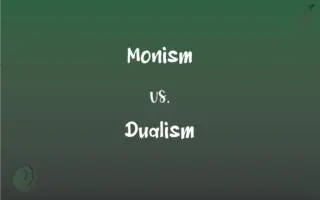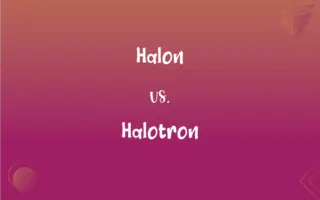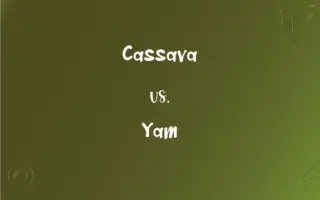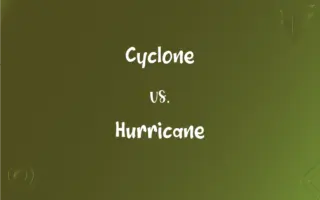Republic vs. Empire: What's the Difference?
Edited by Aimie Carlson || By Janet White || Published on January 8, 2024
A republic is a form of government where power is held by the people and their elected representatives; an empire is a large sovereign state, often ruled by a single authority, with extensive territories and diverse populations.

Key Differences
In a republic, governance is structured through elected representatives and often adheres to a constitution, emphasizing the sovereignty of the people. Conversely, an empire typically denotes a vast territorial expanse under a single, often hereditary, ruler, focusing on expansion and centralized control.
Republics are characterized by a system where laws and policies are created and modified through representatives chosen by citizens. Empires, in contrast, are often defined by autocratic rule, where decisions are made by the emperor or ruling elite, with less emphasis on public consent.
The concept of a republic usually involves a degree of decentralization, with power distributed among various branches or regions. Empires, however, tend to have highly centralized governance, concentrating authority in a central figure or a dominant central government.
Republics often foster citizen participation in governance, encouraging democratic practices like voting. Empires, on the other hand, may have limited or no mechanisms for public participation in governmental decision-making, often relying on the authority of the emperor.
The ideological foundation of a republic is typically rooted in principles of democracy and liberty. In contrast, empires are often associated with conquest, control, and the projection of power over diverse cultures and territories.
ADVERTISEMENT
Comparison Chart
Form of Governance
Governed by elected representatives and often a constitution.
Ruled by an emperor or monarch, with centralized authority.
Power Distribution
Power is distributed among various branches or regions.
Highly centralized, with power concentrated in the ruler.
Public Participation
Encourages democratic practices like voting.
Limited or no public participation in decision-making.
Territorial Scope
Usually confined to a specific geographic region.
Spans extensive territories, often encompassing diverse regions.
Ideological Basis
Based on principles of democracy, liberty, and public sovereignty.
Often associated with conquest, control, and imperial authority.
ADVERTISEMENT
Republic and Empire Definitions
Republic
A state where supreme power is held by the people and their elected representatives.
The United States is a republic, where citizens vote for their leaders.
Empire
A group of nations or peoples ruled over by an emperor, empress, or other powerful sovereign.
The Ottoman Empire was a powerful entity that lasted for centuries.
Republic
A country with a government chosen by its citizens through elections.
Germany is a federal republic with a strong tradition of democracy.
Empire
A supreme authority over several countries, each having its own local rulers.
The Mughal Empire in India was known for its rich culture and architecture.
Republic
A political system without a monarchy, often emphasizing equality.
France became a republic after the revolution, abolishing the monarchy.
Empire
A large political unit, often under a single ruler, controlling many peoples or territories.
The Roman Empire once spanned much of Europe, Africa, and Asia.
Republic
A system where the country's head of state is not a monarch.
Italy transformed from a monarchy to a republic in the mid-20th century.
Empire
An extensive state ruled over by an emperor or monarch.
The British Empire was the largest in history, ruling over a quarter of the world's land.
Republic
A state governed by representatives elected by citizenry.
In a republic like India, the president is elected indirectly by the people.
Empire
A major political unit having a territory of great extent or a number of territories or peoples under a single sovereign authority.
The Mongol Empire expanded rapidly under the leadership of Genghis Khan.
Republic
A political order whose head of state is not a monarch and in modern times is usually a president.
Empire
Of, relating to, or characteristic of a neoclassic style, as in clothing or the decorative arts, prevalent in France during the early 1800s.
Republic
A nation that has such a political order.
Empire
A variety of apple having dark red skin and white flesh.
FAQs
What defines a republic?
A republic is defined by a system of governance where power lies with the people and their elected representatives.
Are empires always autocratic?
While empires are often autocratic, some have had elements of shared governance or limited public participation.
What is an empire?
An empire is a large sovereign state under a single authority, often encompassing diverse territories and populations.
What is the typical size of an empire?
Empires are typically large, covering extensive territories, sometimes across continents.
How does public participation differ in a republic versus an empire?
In a republic, public participation is encouraged through voting and representation, whereas in an empire, public input is often limited.
Do republics have emperors?
No, republics do not have emperors; they are led by elected officials or representatives.
Did empires contribute to cultural exchanges?
Yes, empires often facilitated cultural exchanges due to their control over diverse regions and peoples.
How does power distribution work in a republic?
In a republic, power is often distributed among various branches of government to ensure checks and balances.
How are laws made in a republic?
In a republic, laws are made through a legislative process involving elected representatives.
Can a republic have a monarch?
Typically, a republic does not have a monarch; it is governed by elected officials.
Are modern states more likely to be republics or empires?
Modern states are more likely to be republics, as the concept of empires has diminished in the contemporary world.
Can an empire be democratic?
Historically, empires have not been democratic, focusing on centralized control, but there can be exceptions.
Were empires economically powerful?
Many empires were economically powerful due to their extensive territories and control over trade routes.
What's a key feature of a republic's governance?
A key feature of a republic is its reliance on a constitution or a set of rules governing the state.
Did empires have a common language or culture?
Some empires had a dominant language or culture, but they often encompassed a variety of languages and cultures.
Can a republic become an empire?
Historically, some republics have transformed into empires, though this is less common in the modern era.
How is succession determined in an empire?
Succession in an empire is often hereditary, passing from one monarch to the next.
Is a constitution essential in a republic?
While not always the case, most republics have a constitution that outlines governance and laws.
Do republics emphasize individual rights?
Yes, republics often emphasize individual rights and liberties.
How are leaders chosen in a republic?
Leaders in a republic are typically chosen through elections by the citizenry.
About Author
Written by
Janet WhiteJanet White has been an esteemed writer and blogger for Difference Wiki. Holding a Master's degree in Science and Medical Journalism from the prestigious Boston University, she has consistently demonstrated her expertise and passion for her field. When she's not immersed in her work, Janet relishes her time exercising, delving into a good book, and cherishing moments with friends and family.
Edited by
Aimie CarlsonAimie Carlson, holding a master's degree in English literature, is a fervent English language enthusiast. She lends her writing talents to Difference Wiki, a prominent website that specializes in comparisons, offering readers insightful analyses that both captivate and inform.








































































